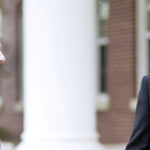Posted: 9/22/03
 |
 |
| Residents (left) investigate the ruins of the historic Harrison Fishing Pier on Norfolk's Chesapeake Bay waterfront Sept. 19. The 450-foot-long pier was destroyed by Hurricane Isabel's storm surge the day before. Workers (right) from the Baptist General Association of Virginia and the Salvation Army plan disaster-relief efforts in the wake of Hurricane Isabel Sept. 19 in Norfolk, Va. They are: volunteer Aaron Lee, a member of Bon Air Baptist Church in Richmond and a student at the University of Richmond; Terry Raines, missions mobilizer for the BGAV's Glocal Missions and Evangelism Team; and Maj. Gene Hogg, the Salvation Army's Tidewater Area commander. (ABP photos by Rob Marus) |
|
Baptists respond with relief
in aftermath of Hurricane Isabel
By Robert Marus
ABP Washington Bureau
NORFOLK, Va. (ABP)–Even as Hurricane Isabel was damaging Baptist churches and leaving many church members homeless along the East Coast, Baptists from other churches and regions were responding to the call for help.
Isabel pounded North Carolina, Virginia, Maryland, Delaware and the District of Columbia Sept. 18-19 with high winds, heavy rains, storm surges and tornadoes. Although the storm was not as destructive as some had feared–it had weakened considerably from the Category 5 rating it held only a few days before landfall–Isabel nonetheless caused significant damage.
 |
| A member of the Disputanta, Va. volunteer fire department works Sept. 19 to clear a tree that fell across U.S. Highway 460 near the town. The tree was one of hundreds that Hurricane Isabel downed along that stretch of highway the day before. Behind him, hundreds of motorists — many of them storm evacuees from the Norfolk-Virginia Beach area — wait to pass. (ABP photo by Rob Marus) |
As of Sept. 22, the storm's death toll had risen to 28. At its peak, it left at least 4.5 million people in the Mid-Atlantic without power–and many also without water or phone service. More than 1 million people remained without power Sept. 22, 72 hours after the storm passed.
Disaster-relief units from at least eight Baptist state or regional conventions were deployed to North Carolina, Virginia and Maryland as of Sept. 22.
A feeding unit from the South Carolina Baptist Convention was among the first to respond. It was based at a Salvation Army installation in Norfolk, representing one of the first collaborations between the Salvation Army and Southern Baptist Disaster Relief Services that was borne out of the Sept. 11, 2001, terrorist attack at the Pentagon.
"I think it's great that we can work with Baptists," said Maj. Gene Hogg, Tidewater Area commander for the Salvation Army. "We know anybody can serve food, anybody can hand out water–but it's the people of God who make a great impact."
Terry Raines, missions mobilizer for the Baptist General Association of Virginia's Glocal Missions Team, said the feeding unit and several like it would serve meals to all comers–emergency workers, police officers and local residents who were without food due to the power outage.
David Phelps, director of missions for Atlantic Baptist Association in one of the hardest-hit regions of North Carolina, said it was remarkable that many of the Baptists in his association have been working to help neighbors and churches clean up even though their own homes were damaged. "It's just God's people doing God's work," he said.
Kim Jessie, church and community missionary for Norfolk Baptist Association, said she appreciated the local church members who volunteered to find housing for members of a Virginia Beach church who lost their homes. Most of the volunteers are themselves dealing with a lack of electricity and tree damage at their own homes.
In Virginia, Baptist disaster-relief teams are serving meals at seven sites. In North Carolina, there were at least three sites as of Sept. 22.
In addition, groups of tree-cutting volunteers from Baptist disaster-relief groups were setting up camp at First Baptist Church of Richmond, Va., to assist overwhelmed municipalities in removing trees from streets and yards.













We seek to connect God’s story and God’s people around the world. To learn more about God’s story, click here.
Send comments and feedback to Eric Black, our editor. For comments to be published, please specify “letter to the editor.” Maximum length for publication is 300 words.